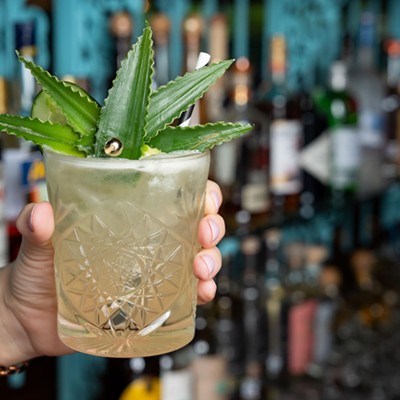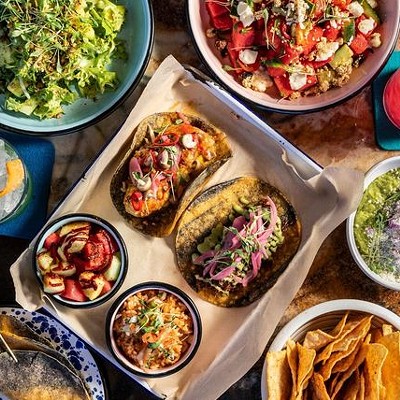I'm a terrible Catholic. Every year, I try to make up for that fact during Lent, vowing to give up television or meat or stringent usury. Depriving myself of creature comforts for 11 percent of my life seems like a fair trade-off for sleeping in on Sundays, and I never take the easy way out, giving up something I won't particularly miss.
Last year I gave up meat, and it led to a significant and ongoing change to the way my family prepares and eats meals. This year, I gave up alcohol and spent the 46 days between Ash Wednesday and Holy Saturday trying to figure out how to make drinks without it seem interesting. It's both more and less difficult than you might think.
It's easy enough to make a nonalcoholic drink, but it's hard to make a nonalcoholic cocktail. When you start with a base of fruit juice, soda or tea, that's often the overall impression of the drink. While juice, soda and tea can be lovely, they don't drink the same as a cocktail. My goal in boozeless cocktailing is to make the experience of a nonalcoholic drink as much like a cocktail as possible. In order to avoid the juice/soda/tea trap, you have to get creative.
Generally, I've found that it doesn't work very well to try to replicate actual cocktails sans booze. Think through the elements you like in a cocktail -- bitter, citrus, sweetness, depth, viscosity -- and try to find ways to incorporate those elements. To create interest and complexity, it often helps to start from scratch, creating your own ingredients to suit the need, bringing in bitterness and complexity, deep and nuanced sweetness, or a hint of viscosity to suit your tastes.
I first became acquainted with the notion of shrubs about a year ago, but hadn't really made the time for them. I love vinegar as much as the next guy (an odd turn of phrase), but the thought of "drinking vinegar" wasn't quite appealing enough to bother with. Then I had to cut booze out of my drinks. Suddenly, shrub seemed to promise layers of flavor and, frankly, "non-juice-ness" that I was finding hard to get elsewhere. Part of what I love about cocktails is that "huh" moment, when you first taste something unexpected and unexpectedly delicious. I hoped I might find that moment in a batch of shrub.
Essentially a mix of acid, fruit and sugar, shrubs go at least as far back as Colonial America, where they were used as a method of preserving fruit (via sugar and acid, kind of like a sweet pickle), and enjoyed as a refreshing summer tipple. When you get right down to it, there's not much difference between lemonade and shrub, and everybody loves lemonade.
Ever the diligent researcher, I developed my shrub "recipe" by casually looking at a few articles on the subject and then winging it. Figuring that the original idea of preserving an overabundance of produce was as worthwhile a guiding light as any, I turned to the fridge to see what needed preserving.
My wife is a chronic fruit-hoarder. Grocery trips often involve one cart for clamshells of blueberries and strawberries, sacks of apples and bunches of still-green bananas (bizarrely, my kids eat them that way despite my exhortations to stick the starchy devils in a bag and wait a few days, for Pete's sake), and another cart for everything else. Occasionally, a few more exotic specimens pop up.
I still remember the time she bought an Ugli fruit, owing mostly to its appearance in a beloved children's book called Alphabet Soup, only to let it languish on the counter, its already wrinkly skin getting sadder and baggier by the day. I tried to rescue it for various applications, but she always swooped in at the last second, claiming that she would, after all, eat the thing. She never did. It died an ignominious death in the impromptu compost pile outside our kitchen door.
Determined not to let it happen again, I grabbed a pint of blackberries I knew would never be eaten (there were strawberries and a sack of clementines in line ahead of them), and claimed them as my own. Before she had the chance to scold me for using the fruit (not really) destined for the kids' lunches in one of my projects, I had them dumped in a jar with a bit of sugar.
In a flight of fancy and an effort to do something new with the most recent bunch of beets in a seemingly endless procession of bunches of beets left on my doorstep twice monthly, I diced the roots into tiny, bloody gems and gave them the same treatment. Just for kicks, and because I love blackberries and Sriracha, I added about a tablespoon of the red stuff to the blackberry mix.
After the fruit and beets had macerated in their sugar beds for about 18 hours, giving up a fair amount of liquid in the process, I added an equal amount of vinegar (homemade vermouth vinegar) and put the jars back in the fridge for a few days, shaking every so often to encourage the sugar to dissolve. A quick strain, and my shrubs were ready to go. As a side note, the resulting pickled beets were actually quite tasty on their own.
The acidity at this point was bracing, but the character of the fruit and beets came through strong and clear. The blackberry version had just enough background heat to add some depth of character, tasting otherwise full and lush, the vinegar fading a bit more into the background. It was surprisingly balanced.
The beet version proved my favorite, all the subtleties of the root playing out under the mantle of sweet-tart syrup. Earthy, rich, subtly savory. Herbaceous and floral in the finish. Though it was a bit thinner and a fair sight more bracing, it was also intriguing and surprisingly delicious, which I figured would make it perfect for cocktails.
Simply mixed into sparkling water, the shrubs were delicious, interesting and refreshing. My wife took some convincing, especially on the beets issue. She likes neither beets nor strong vinegar flavors. In time, though, I was able to craft a couple of drinks that won her over. Stay tuned for details.
Follow Eating Our Words on Facebook and on Twitter @EatingOurWords






